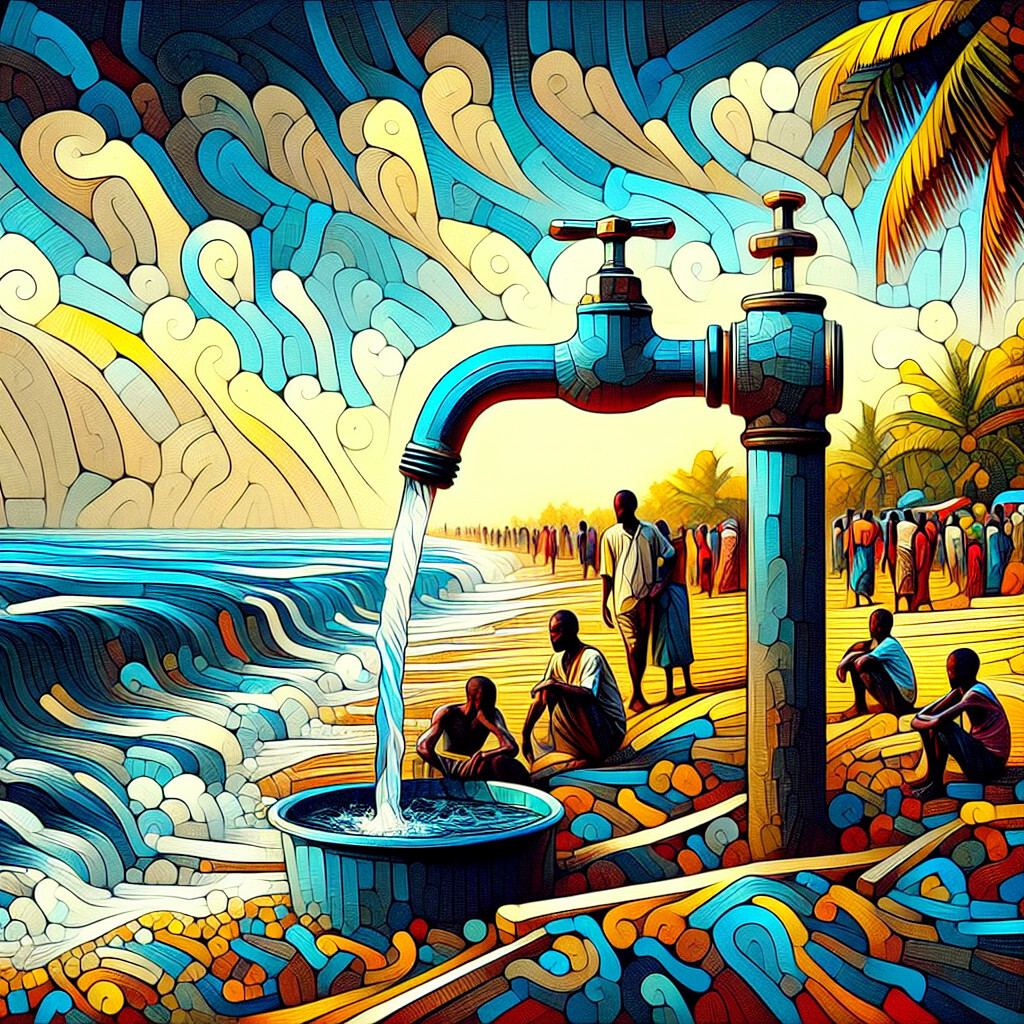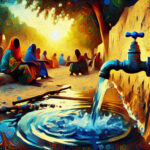-
Table of Contents
“Ivory Coast’s Tap Water: A Challenge of Quality and Accessibility.”
Introduction

The tap water in Ivory Coast, a West African nation, is a subject of concern due to its quality and accessibility. While the urban areas have a relatively better supply of tap water, the rural regions face significant challenges with access to clean and safe drinking water. The water in many areas is often contaminated with harmful bacteria and pollutants due to inadequate sanitation facilities and industrial waste. Therefore, it’s not uncommon for locals and visitors to rely on bottled or boiled water for consumption. Despite government efforts to improve the situation, the issue of clean tap water remains a significant public health concern in Ivory Coast.
Understanding the Quality of Tap Water in Ivory Coast
Ivory Coast, also known as Côte d’Ivoire, is a country located on the West African coast. It is renowned for its cultural diversity, vibrant economy, and picturesque landscapes. However, one aspect that often raises concerns among its residents and visitors alike is the quality of tap water. This article aims to provide an in-depth understanding of the quality of tap water in Ivory Coast.
The quality of tap water in any region is determined by several factors, including the source of the water, the treatment process it undergoes, and the infrastructure used for its distribution. In the case of Ivory Coast, the primary source of tap water is surface water, which includes rivers, lakes, and reservoirs. This water is then treated in treatment plants before being distributed to households and businesses.
However, the quality of tap water in Ivory Coast is not consistent across the country. In urban areas, where there is better access to water treatment facilities and more robust infrastructure, the tap water is generally safe for consumption. The government has made significant investments in improving water supply systems in cities like Abidjan, the economic capital of the country. As a result, the tap water in these areas meets the World Health Organization’s (WHO) standards for drinking water.
On the other hand, the situation is quite different in rural areas. Due to the lack of adequate infrastructure and access to water treatment facilities, the quality of tap water in these regions is often poor. The water may contain harmful bacteria, viruses, and parasites, making it unsafe for direct consumption. Furthermore, the water may also be contaminated with chemicals from agricultural runoff, which can pose serious health risks.
The government of Ivory Coast, in collaboration with international organizations, has been working to improve the quality of tap water in rural areas. These efforts include building new water treatment facilities, improving the existing infrastructure, and educating the local population about the importance of safe drinking water. However, these initiatives are still in their early stages, and it will take time before significant improvements are seen.
In the meantime, it is recommended that residents and visitors in rural areas of Ivory Coast take precautions when using tap water. This includes boiling the water before consumption or using water purification tablets. Bottled water is also a safe alternative, although it may not be readily available in some remote areas.
In conclusion, the quality of tap water in Ivory Coast varies significantly between urban and rural areas. While the tap water in cities is generally safe for consumption, the same cannot be said for rural areas. Therefore, it is essential to take necessary precautions when using tap water in these regions. The government’s ongoing efforts to improve the water supply system are promising, and it is hoped that in the future, all residents of Ivory Coast will have access to safe and clean drinking water.
The Impact of Infrastructure on Ivory Coast’s Tap Water
The quality of tap water in any region is largely dependent on the infrastructure in place to treat and distribute it. In the case of Ivory Coast, a West African nation with a population of over 26 million, the state of the infrastructure has a significant impact on the quality of the tap water.
Ivory Coast has made significant strides in improving its water infrastructure over the past few decades. The government has invested heavily in the construction of new water treatment plants and the expansion of the water distribution network. These efforts have resulted in a substantial increase in the number of people with access to clean drinking water. According to the World Health Organization, the percentage of the population with access to clean drinking water increased from 77% in 2000 to 81% in 2015.
However, despite these improvements, challenges remain. The rapid urbanization of Ivory Coast’s cities, particularly Abidjan, the economic capital, has put a strain on the existing water infrastructure. The water treatment plants and distribution networks were not designed to cope with the rapid population growth and the resulting increase in demand for water. This has led to frequent water shortages in some parts of the city, particularly during the dry season.
Moreover, the quality of the tap water can vary significantly from one area to another. In some parts of the country, particularly in rural areas, the water infrastructure is less developed, and the tap water may not be safe to drink. In these areas, people often rely on wells or surface water for their drinking water, which can be contaminated with harmful bacteria or parasites.
The government of Ivory Coast is aware of these challenges and has launched several initiatives to improve the water infrastructure. For instance, in 2016, the government launched a major project to expand the water distribution network in Abidjan and other major cities. This project, which is being financed by the World Bank, aims to increase the capacity of the water treatment plants and extend the water distribution network to reach more people.
In addition, the government is also working to improve the quality of the tap water. It has introduced stricter regulations for water treatment and has increased the monitoring of the water quality. These measures have resulted in a significant improvement in the quality of the tap water in many parts of the country.
However, despite these efforts, there is still a long way to go. The infrastructure in many parts of the country is still inadequate, and many people still do not have access to clean drinking water. Moreover, the rapid urbanization and population growth are likely to continue to put pressure on the water infrastructure.
In conclusion, the quality of the tap water in Ivory Coast is largely dependent on the state of the infrastructure. While significant progress has been made in improving the water infrastructure, challenges remain. The government is making efforts to address these challenges, but it will take time to ensure that everyone in the country has access to clean drinking water.
Health Implications of Drinking Tap Water in Ivory Coast
The Ivory Coast, also known as Côte d’Ivoire, is a country located on the West African coast. It is known for its diverse culture, vibrant economy, and rich history. However, one aspect that often goes unnoticed is the quality of tap water in the country and its implications on health. This article aims to shed light on this critical issue.
The quality of tap water in Ivory Coast varies significantly across the country. In urban areas, the tap water is generally safe to drink, thanks to the efforts of the national water company, SODECI, which ensures that the water is treated and meets the World Health Organization’s standards. However, in rural areas, the situation is quite different. The lack of infrastructure and resources often means that the water is not adequately treated, making it unsafe for consumption.
The health implications of drinking untreated tap water are severe. It can lead to a range of waterborne diseases, including cholera, typhoid, and dysentery. These diseases are caused by bacteria, viruses, and parasites that thrive in untreated water. In Ivory Coast, diarrheal diseases are among the leading causes of death, particularly among children under five years old. This is largely due to the consumption of contaminated water.
Moreover, the presence of harmful chemicals in water can also pose serious health risks. In certain regions of Ivory Coast, the tap water has been found to contain high levels of fluoride. While fluoride is beneficial for dental health in small amounts, excessive intake can lead to dental and skeletal fluorosis, conditions characterized by damage to teeth and bones.
Furthermore, the lack of clean drinking water also has indirect health implications. For instance, it forces people, particularly women and children, to travel long distances to fetch water. This not only exposes them to safety risks but also takes away time that could be used for other productive activities, such as education and income generation. It also contributes to physical fatigue and injuries.
The government of Ivory Coast, along with various international organizations, has been working to improve the quality of tap water in the country. Efforts are being made to expand the water supply network, especially in rural areas, and to ensure that the water is adequately treated. However, these initiatives face numerous challenges, including lack of funding, weak institutional capacity, and rapid urbanization.
In conclusion, the quality of tap water in Ivory Coast has significant implications for health. While the tap water in urban areas is generally safe to drink, in rural areas, it is often contaminated with harmful bacteria, viruses, and chemicals. This not only leads to a range of diseases but also has indirect health effects, such as physical fatigue and injuries. Therefore, there is an urgent need to improve the quality of tap water in the country, particularly in rural areas. This requires not only investment in infrastructure and resources but also strengthening of institutional capacity and public awareness about the importance of clean drinking water.
Solutions to Improve the Tap Water Situation in Ivory Coast
Ivory Coast, also known as Côte d’Ivoire, is a country located on the West African coast. It is known for its diverse culture, rich history, and vibrant economy. However, despite its many attributes, the country faces a significant challenge in providing clean and safe tap water to its citizens. This issue is not unique to Ivory Coast; it is a common problem in many developing countries. However, the situation in Ivory Coast is particularly concerning due to the country’s rapid urbanization and population growth, which have put immense pressure on its water infrastructure.
The tap water situation in Ivory Coast is characterized by a lack of access to clean water, especially in rural areas and poor urban neighborhoods. According to the World Health Organization, only about 81% of the population in Ivory Coast has access to clean drinking water. This means that nearly one in five people in the country do not have access to safe water. The situation is even worse in rural areas, where access to clean water can be as low as 68%.
The quality of tap water in Ivory Coast is also a major concern. The water infrastructure in the country is often outdated and poorly maintained, leading to frequent water contamination. Waterborne diseases such as cholera and typhoid are common, especially during the rainy season when the risk of contamination is high. Furthermore, the lack of proper sanitation facilities exacerbates the problem, as untreated waste often ends up in the water supply.
Despite these challenges, there are several solutions that can significantly improve the tap water situation in Ivory Coast. One of the most effective solutions is investing in the country’s water infrastructure. This includes building new water treatment plants, repairing and upgrading existing facilities, and expanding the water distribution network to reach more people. Such investments not only improve the quality of tap water but also increase its availability.
Another solution is promoting water conservation and efficient use of water resources. This can be achieved through public education campaigns that raise awareness about the importance of water conservation and provide practical tips on how to save water. Additionally, implementing water-efficient technologies and practices in agriculture, which is the largest consumer of water in the country, can significantly reduce water demand and pressure on the water supply.
Improving sanitation facilities is also crucial in improving the tap water situation in Ivory Coast. This includes building more toilets and sewage treatment plants, and promoting good hygiene practices. Proper sanitation reduces the risk of water contamination and the spread of waterborne diseases.
Lastly, the government and non-governmental organizations can play a crucial role in improving the tap water situation in Ivory Coast. They can provide funding for water projects, enforce water quality standards, and advocate for policies that prioritize water security. International aid can also play a significant role in addressing the water crisis in the country.
In conclusion, the tap water situation in Ivory Coast is a complex issue that requires a multifaceted approach. By investing in water infrastructure, promoting water conservation, improving sanitation, and leveraging the support of government and non-governmental organizations, it is possible to significantly improve the tap water situation in the country. Despite the challenges, there is hope for a future where every citizen of Ivory Coast has access to clean and safe tap water.
Q&A
1. Question: Is the tap water in Ivory Coast safe to drink?
Answer: No, the tap water in Ivory Coast is generally not considered safe to drink. It’s recommended to drink bottled or boiled water.
2. Question: What is the quality of tap water in Ivory Coast?
Answer: The quality of tap water in Ivory Coast varies greatly. In urban areas, the water may be treated but can still contain harmful bacteria or viruses. In rural areas, the water is often untreated and can be contaminated.
3. Question: Are there efforts to improve tap water quality in Ivory Coast?
Answer: Yes, there are ongoing efforts by the government and international organizations to improve water infrastructure and quality in Ivory Coast. However, progress is slow and many areas still lack access to clean, safe water.
4. Question: What are the common contaminants in Ivory Coast’s tap water?
Answer: Common contaminants in Ivory Coast’s tap water can include bacteria, viruses, and sometimes heavy metals. The water can also be contaminated by agricultural runoff, which can include pesticides and fertilizers.
Conclusion
The tap water in Ivory Coast is generally not safe to drink. Contamination from poor sanitation and harmful microorganisms often lead to waterborne diseases. Therefore, it is recommended to drink bottled or adequately treated water.






